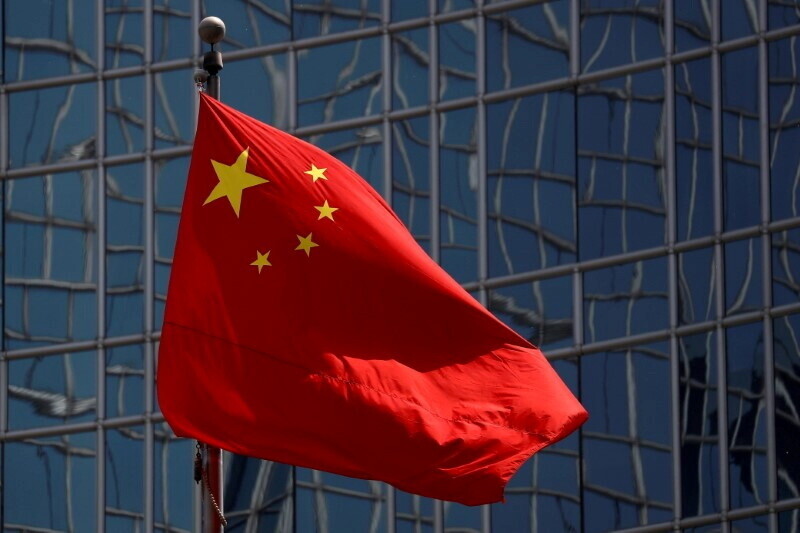hankyoreh
Links to other country sites 다른 나라 사이트 링크
China blasts Camp David summit as seeking bloc security at expense of others

The Chinese government responded to the summit between South Korea, the US and Japan that took place at Camp David on Friday by asserting that “no country should seek its own security at the expense of other countries’ security interests.”
“In a world of change and disorder on the security front, all parties should act on the vision of a community of shared security for mankind, practice true multilateralism, and jointly address various security challenges,” said Wang Wenbin, the spokesperson of China’s Foreign Ministry in the daily press conference on Friday.
“The international community has its fair judgment on who is stoking conflicts and exacerbating tensions. The Asia-Pacific is an anchor for peace and development and a promising land for cooperation and growth, and should never be turned into a wrestling ground for geopolitical competition again.”
China’s state-run wire service Xinhua News also criticized the trilateral summit as inciting strife between opposing camps in its Chinese edition.
“The reason the US was so eager to organize this meeting is that it seeks to build a small bloc with Korea and Japan, incite strife with opposing blocs, and treat other countries’ strategic security as a launchpad for preserving its own hegemony,” the wire service wrote in an article titled “The perilous plot of the ROK-US-Japan summit at Camp David.”
Xinhua wrote that while the three countries are developing close ties, it won’t be easy for Korea and Japan to bury the hatchet over issues of history. “American efforts to unite South Korea and Japan are a product of Cold War thinking,” the wire service wrote. “Such a maneuver will inevitably fan the flames of antagonism, compromise the strategic security of other countries and jeopardize regional stability. By sowing seeds of division and intensifying opposition, the meeting represents a perilous gambit that might resurrect the specter of the Cold War.”
One day prior, the state-run Global Times ran an editorial titled “Does S. Korea know the implications of wading into this muddy water?” in which it criticized Korea’s attitude toward the summit, writing, “In recent years, South Korea has strived to achieve a relative balance in diplomacy and strategy amid geopolitical pressures, and has achieved remarkable economic and social development. However, this crucial relative balance for South Korea is being disrupted by the Yoon government internally and by Washington and Japan externally.”
By Choi Hyun-june, Beijing correspondent
Please direct questions or comments to [english@hani.co.kr]

Editorial・opinion
![[Editorial] Perilous stakes of Trump’s rhetoric around US troop pullout from Korea [Editorial] Perilous stakes of Trump’s rhetoric around US troop pullout from Korea](https://flexible.img.hani.co.kr/flexible/normal/500/300/imgdb/original/2024/0509/221715238827911.jpg) [Editorial] Perilous stakes of Trump’s rhetoric around US troop pullout from Korea
[Editorial] Perilous stakes of Trump’s rhetoric around US troop pullout from Korea![[Guest essay] Preventing Korean Peninsula from becoming front line of new cold war [Guest essay] Preventing Korean Peninsula from becoming front line of new cold war](https://flexible.img.hani.co.kr/flexible/normal/500/300/imgdb/original/2024/0507/7217150679227807.jpg) [Guest essay] Preventing Korean Peninsula from becoming front line of new cold war
[Guest essay] Preventing Korean Peninsula from becoming front line of new cold war- [Column] The state is back — but is it in business?
- [Column] Life on our Trisolaris
- [Editorial] Penalties for airing allegations against Korea’s first lady endanger free press
- [Editorial] Yoon must halt procurement of SM-3 interceptor missiles
- [Guest essay] Maybe Korea’s rapid population decline is an opportunity, not a crisis
- [Column] Can Yoon steer diplomacy with Russia, China back on track?
- [Column] Season 2 of special prosecutor probe may be coming to Korea soon
- [Column] Park Geun-hye déjà vu in Yoon Suk-yeol
Most viewed articles
- 1‘Free Palestine!’: Anti-war protest wave comes to Korean campuses
- 2[Editorial] Perilous stakes of Trump’s rhetoric around US troop pullout from Korea
- 3Behind-the-times gender change regulations leave trans Koreans in the lurch
- 4Nuclear South Korea? The hidden implication of hints at US troop withdrawal
- 5[Photo] ‘End the genocide in Gaza’: Students in Korea join global anti-war protest wave
- 6Korean president’s jailed mother-in-law approved for parole
- 760% of young Koreans see no need to have kids after marriage
- 8In Yoon’s Korea, a government ‘of, by and for prosecutors,’ says civic group
- 9[Guest essay] Preventing Korean Peninsula from becoming front line of new cold war
- 10Yoon’s revival of civil affairs senior secretary criticized as shield against judicial scrutiny